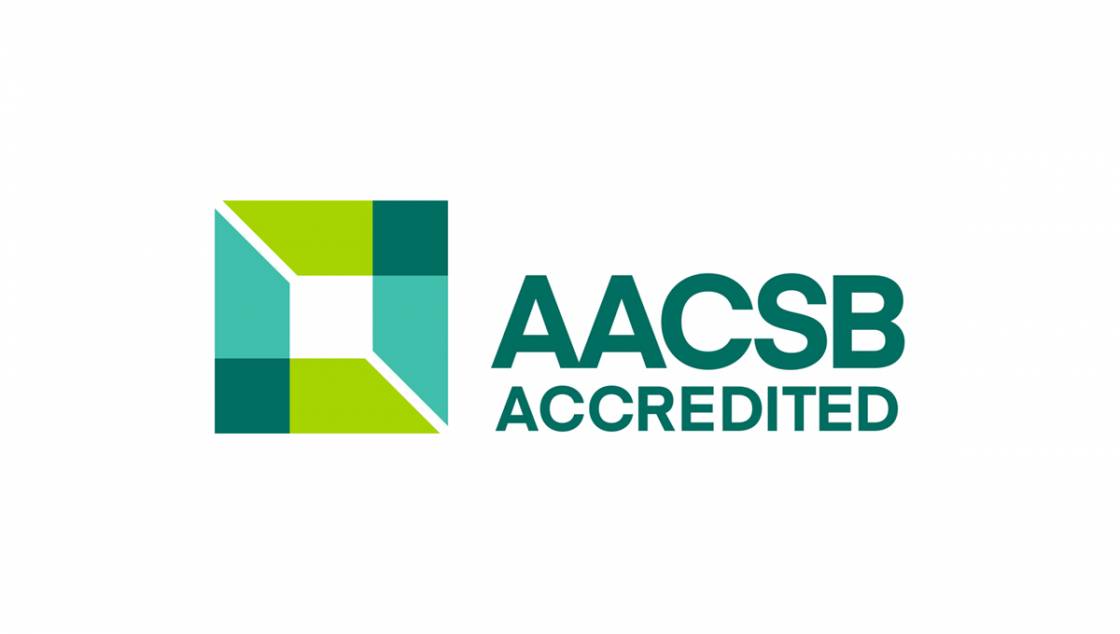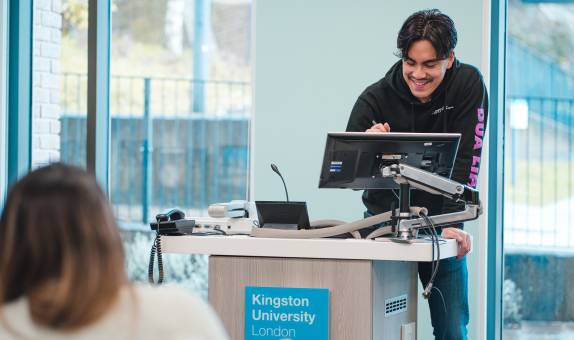Business HND

Teaching Excellence Framework (TEF) Gold award
Our commitment to high quality teaching has been recognised with a TEF Gold rating. The University has received an overall rating of Gold, as well as securing a Gold award in the framework's two new student experience and student outcomes categories.
Why choose this course?
This course is ideal if you have a strong interest in business or wish to boost your employability by gaining a higher-level business qualification. It'll develop your analytical business skills and prepare you for the working environment.
You'll be introduced to the general business environment and the fundamentals of business. You'll examine business issues from a range of perspectives, learning to analyse management problems and find workable solutions.
This course is taught at Kingston College (validated by Kingston University), just five minutes from the University's Penrhyn Road campus. You'll be taught by staff at Kingston College. The team includes senior academics, professional practitioners with industry experience, demonstrators and technical officers.
| Where taught | Attendance | UCAS code | Campus code | Year of entry |
|---|---|---|---|---|
| Kingston College | 2 years full time | 422N | K | 2025 |
| Main Location | Kingston College |
Reasons to choose Kingston University
- This HND is a pathway to a full honours degree. You can "top-up" with just one further year of study.
- You'll be able to use Kingston University's wide range of facilities, including study skills classes, the library and the many sports and leisure options.
- Teaching is in small groups, with a variety of methods used to support your individual learning.
What you will study
The course will comprise the following modules:
Year 1
Year 2
In Year 1, you will develop core study skills, boosting your employability. You will study the general global business environment and be introduced to the fundamentals of business. Other modules examine the world of work, how the business environment, including economics, influences business, the fundamentals of marketing and an introduction to people and organisations. At this level, you are expected to be able to describe and structure business problems. The knowledge and skills developed will prepare you for broader and deeper study of key management functions in Year 2.
Core modules
Business and Study Fundamentals
30 credits
This module focuses on building essential business, study and employability skills, and prepares you to be successful on your course and in your subsequent career in business and management. It also provides you with an opportunity to develop life-long learning and personal development skills.
The early part of the module will develop the essential study skills required to be successful on all the modules on Level 4 of the HND. It will support the learning and study taking place in those modules and ensure you are engaging with appropriate personal academic planning and monitoring. As the module develops, you will start to evidence those skills in the context of your future career and learn how to build your employability, both for your own self-awareness and for the recruitment and selection activities you may face for placements and graduate employment. You will have the opportunity to apply your learning in a practical way, working as part of a group on a business project/problem.
Business Organisations and the Wider Environment
30 credits
This module is a core requirement for students studying the Business HND. It aims to introduce you to organisations and the environment of the world of work, and to provide you with models (based on economic and business theory) to enable you to apply your learning to understand and analyse real-life scenarios.
Career and Employability Development/HRM
30 credits
This module offers you a structured and supported framework to critically reflect upon and evaluate your skills, your career motivations and your development needs. It will introduce and apply career choice and development theories as well as provide an opportunity to understand the role of HRM in recruitment and selection processes (such as CV screening, and interviewing techniques). You will develop skills such as self-reflection, career management and planning from an individual perspective as well as from the employer's viewpoint (HRM). You will also develop research skills and will have the opportunity to build upon the knowledge you have learnt in other modules regarding different business functions and environments.
Essentials of Marketing
30 credits
This module is a core requirement for students studying the HND in Business. It aims to introduce you to the marketing concept and enable you to apply the learning to simulated and/or practical situations. Further, it aims to develop transferable skills that will support you in your studying and employability. To that end, the module forms part of an integrated overall level 4 and HND structure.
In Year 2, you will develop analytical skills and suggest recommendations to business issues. You will further your knowledge of financial management, operations and project management and international business and culture, and make specific plans for employment.
Core modules
Financial and Managerial Decision Making
30 credits
This module is a core module which introduces you to accounting and financial decision making. The module has two main elements: retrospective (historical) accounting and prospective forward looking accounting. Initially you will learn retrospective accounting which consists of the basic accounting concepts and accounting standards of Financial Accounting and apply these in preparing a set of financial statements for a sole trader. You will simultaneously learn to use accounting software (SAGE). You will also learn about the regulatory and reporting requirements for different businesses. You will then progress on to prospective accounting which consists of developing management accounting techniques for decision making for the short term and long term. You will also learn how to analyse and interpret and explain basic financial information and use your analysis to make recommendations.
Introduction to Project and Operations Management
30 credits
This module is a core requirement for those studying the HND in Business. It aims to introduce you to a project management methodology that can be used to develop the plans for to a hypothetical but realistic project. You will then examine operations models and concepts that will enable you to analyse real world operations, identify operational problems and suggest appropriate improvements. You will then compare and contrast the way operations and project managers typically work.
International Business and Culture
30 credits
This module is a core requirement for students studying the HND in Business. It aims to introduce you to the international environment within which businesses operate and to provide you with appropriate conceptual models to enable you to apply the learning to understand and analyse real world international business decisions.
People and Organisations
30 credits
This module is intended to answer two key questions for students - What is an organisation and how do people influence how organisations work? It will also allow you the opportunity to further develop the skills you will need in order to be successful within an organisation. You will consider key aspects of organisational behaviour and apply these to case study situations.
Future Skills
Knowledge to give you the edge
Embedded within every course curriculum and throughout the whole Kingston experience, Future Skills will play a role in shaping you to become a future-proof graduate, providing you with the skills most valued by employers such as problem-solving, digital competency, and adaptability.
As you progress through your degree, you'll learn to navigate, explore and apply these graduate skills, learning to demonstrate and articulate to employers how future skills give you the edge.
At Kingston University, we're not just keeping up with change, we're creating it.

Kingston Business School Accreditations
Kingston Business School holds the prestigious international accreditation by the AACSB (Association to Advance Collegiate Schools of Business) in recognition of the excellence of its business education. This accreditation has been earned by just 5% of the world's business schools and recognises the high quality and standard of our business degree offerings.
Entry requirements
Teaching and assessment
You are taught through a combination of lectures and seminars. Seminars enable you to discuss and develop your understanding of topics covered in lectures in smaller groups of students. In addition, you have timetabled meetings with your personal tutor.
After this course
By choosing this HND you'll not only be prepared for success in the workplace, you'll also be able to continue to a full honours degree through a ‘top-up' programme.
Who teaches this course?
You will be taught by staff at Kingston College, who are an experienced teaching team whose expertise and knowledge are closely matched to the content of the modules on the course. The team includes senior academics, professional practitioners with industry experience, demonstrators and technical officers.
Course fees and funding
Additional costs
Depending on the programme of study, there may be extra costs that are not covered by tuition fees which students will need to consider when planning their studies. Tuition fees cover the cost of your teaching, assessment and operating University facilities such as the library, access to shared IT equipment and other support services. Accommodation and living costs are not included in our fees.
Where a course has additional expenses, we make every effort to highlight them. These may include optional field trips, materials (e.g. art, design, engineering), security checks such as DBS, uniforms, specialist clothing or professional memberships.
Course changes and regulations
The information on this page reflects the currently intended course structure and module details. To improve your student experience and the quality of your degree, we may review and change the material information of this course. Course changes explained.
Programme Specifications for the course are published ahead of each academic year.
Regulations governing this course can be found on our website.





